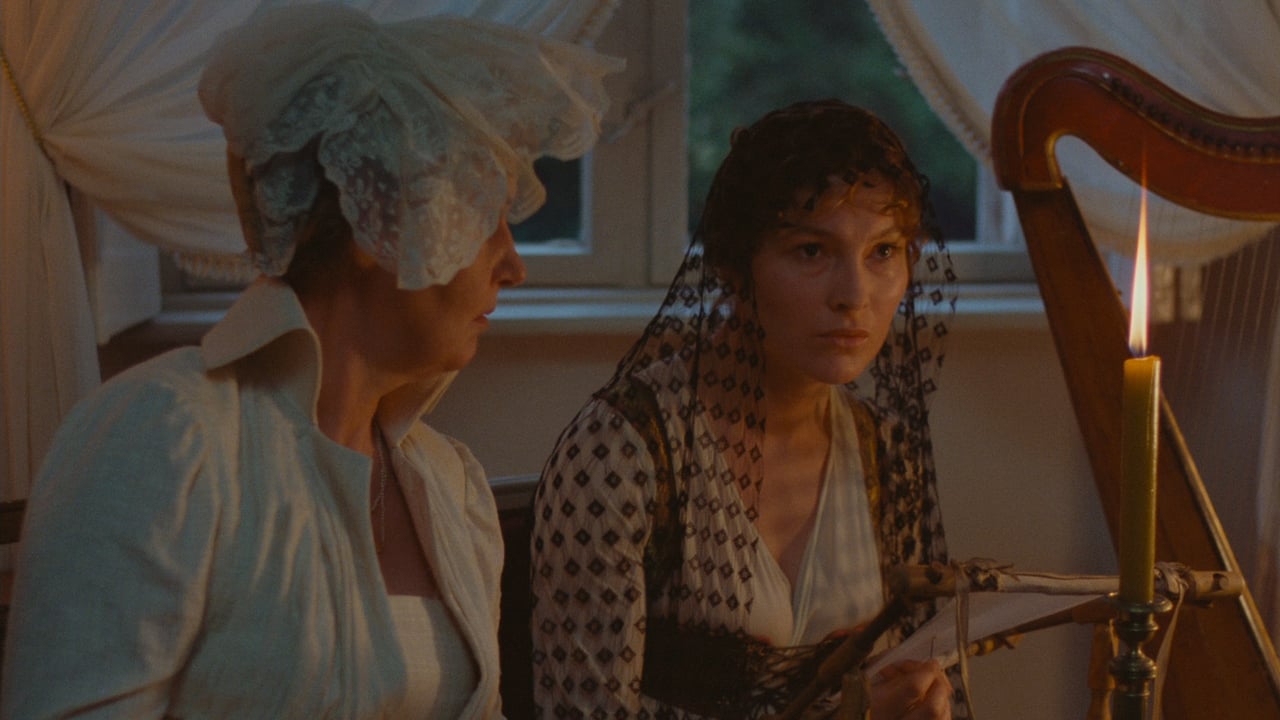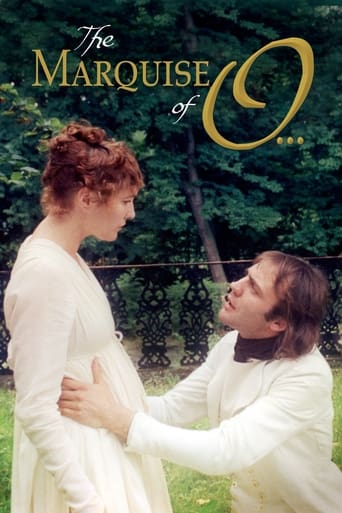Hellen
I like the storyline of this show,it attract me so much
StunnaKrypto
Self-important, over-dramatic, uninspired.
Mehdi Hoffman
There's a more than satisfactory amount of boom-boom in the movie's trim running time.
Staci Frederick
Blistering performances.
Horst in Translation (filmreviews@web.de)
"Die Marquise von O..." or "The Marquise of O" is a co-production between West Germany and France from 1976, so this one has its 40th anniversary this year. The cast is almost exclusively German, but the writer and director is Éric Rohmer which explains the French involvement. Rohmer was in his 50s at that point and already an Oscar nominee. His 100-minute movie here was based on a Heinrich von Kleist story and is certainly among the writer's most known adaptations in film. I will not mention all the actors in here in detail as you can see them in the cast list, but it can be said that lead actress Edith Clever who plays the title character for a German Film Award for her performance here and so did her male co-lead Bruno Ganz for whom it was the big breakthrough as an actor and he worked with Herzog, Wenders and many other prestigious filmmakers in the years to come. This movie here received lots of awards attention, probably also because German period pieces are really nothing you get to see that frequently.Most of this praise and awards recognition (also like the BAFTA win) had to do with the technical side of the film and also the visual side and I would agree that costumes, sets and cinematography are those areas where the film works the best. Or I could also say "only areas where it works" as I personally was not impressed at all by the viewing. Clever was not really memorable as the main character and being a big Ganz fan, I was disappointed by how he went over-the-top with his performance on some occasion. The costumes gave him enough showiness already and I hoped for more quiet subtlety. Also I felt that Rohmer's story here just wasn't enough for 100 minutes and that he stretched the few crucial plot points )pregnancy, relationship between the two protagonists) until they became really uninteresting to watch from the perspective of the audience. I am very much baffled by this film's success. I cannot deny it. I have not seen (enough) other stuff by Rohmer, which is why I am still undecided if the maker is the problem here or just the subject. But I do know for sure that I cannot recommend the watch here. Thumbs down from me and admittedly I will say that period pieces have never been my favorite genre of film, but still there are more than just a few that I consider superior to this one. Watch something else instead.
MARIO GAUCI
Despite – or perhaps because of – its being atypically filmed in German, this remains one of Rohmer's more recognized titles. The period setting (the director's first, though not last, feature to adopt this) lends an aesthetic quality in this case which complements – or, one might say, excuses – his customary austerity. The simple plot proves quietly fascinating throughout: an aristocratic lady is saved from near-rape by an enemy Count (Bruno Ganz); though the woman is no great beauty, the man apparently loses his head over her, almost compromising his own rank into the bargain. The Marquise and her family cannot understand this impulsive behavior but, then, she finds herself mysteriously pregnant; her parents and brother obviously shun her, but the returning Count is even more intent on marrying her (she is a widow who has already borne two children). Eventually, the Marquise puts an ad in a newspaper requesting the father to present himself – and, at the appointed hour, it is none other than the mortified Count himself who turns up (having apparently taken advantage of her while she was unconscious on the night of the attack)! As with all of the director's work, this is certainly not for all tastes but, as I said at the beginning, it is exquisitely filmed (by Nestor Almendros) on wonderful and expansive locations – though the approach is thoroughly low-key (mostly confined to medium shots of people conversing against a backdrop of candle-lit interiors), in keeping with the intimate nature of the tale. While, for all his straining for realism, even Rohmer's modern-day efforts could be deemed contrived on occasion, here he seems to have embraced a deliberate artificiality (the expulsion of the bewildered heroine in particular is redolent of barnstorming melodramas!) perhaps to better convey the intolerant morality of its (distant) time. Though I am not sure parallels to the Immaculate Conception were intended, THE MARQUISE OF O does recall Manoel De Oliveira's contemporaneous and, regrettably, little-known BENILDE OR THE VIRGIN MOTHER (1975) which, while comparably 'self-conscious', is perhaps an even more compelling, thought-provoking – and altogether spiritual – experience.
Lee Eisenberg
I originally read Heinrich von Kleist's "Die Marquise von O..." in a German class. Renting the movie, I naturally had to wonder whether or not they would stay faithful to the novel. They did. This story of an 18th century marquise (Edith Clever) who inexplicably becomes pregnant has surprises at every corner. In case you don't know the whole story, I won't spoil it for you, but you will be surprised at what happens. Strong performances by Clever and Bruno Ganz as The Count carry the movie, as does the perfect direction from Eric Rohmer.Oh, and in case you're wondering about that "O...", it's deliberately incomplete, as are some other names in the story.
zetes
Not one of Rohmer's best, especially from a writing standpoint. It seems to me that he wasn't particularly interested in this project, or at least he is unable to make the story as interesting as I find most of his other films. However, several points elevate this film far beyond what it could have been. First thing, the cinematography, by Néstor Almendros, is stunning. Rohmer pays particular attention to the composition, something which he isn't generally known for. I think it hurts the film, but one thing can't be denied: it looks as painterly as possible. Also, the performances are generally great. Bruno Ganz kind of disappointed me, but that's mainly because I consider him one of the greatest actors. His performance here is good, but not at the level of the other films in which I've seen him. On the other hand, the star of the film, Edith Clever, is amazing as the titular character. She becomes pregnant even though she has not had relations with a man since her husband died a couple of years earlier. She must face the prejudices of the time (a good story of a woman up against society, though it's been done better before). The Marquise's parents are played by Peter Lühr and Edda Seippel, and they both give excellent performances as well. All in all, a beautiful experience, if not the most exciting.

